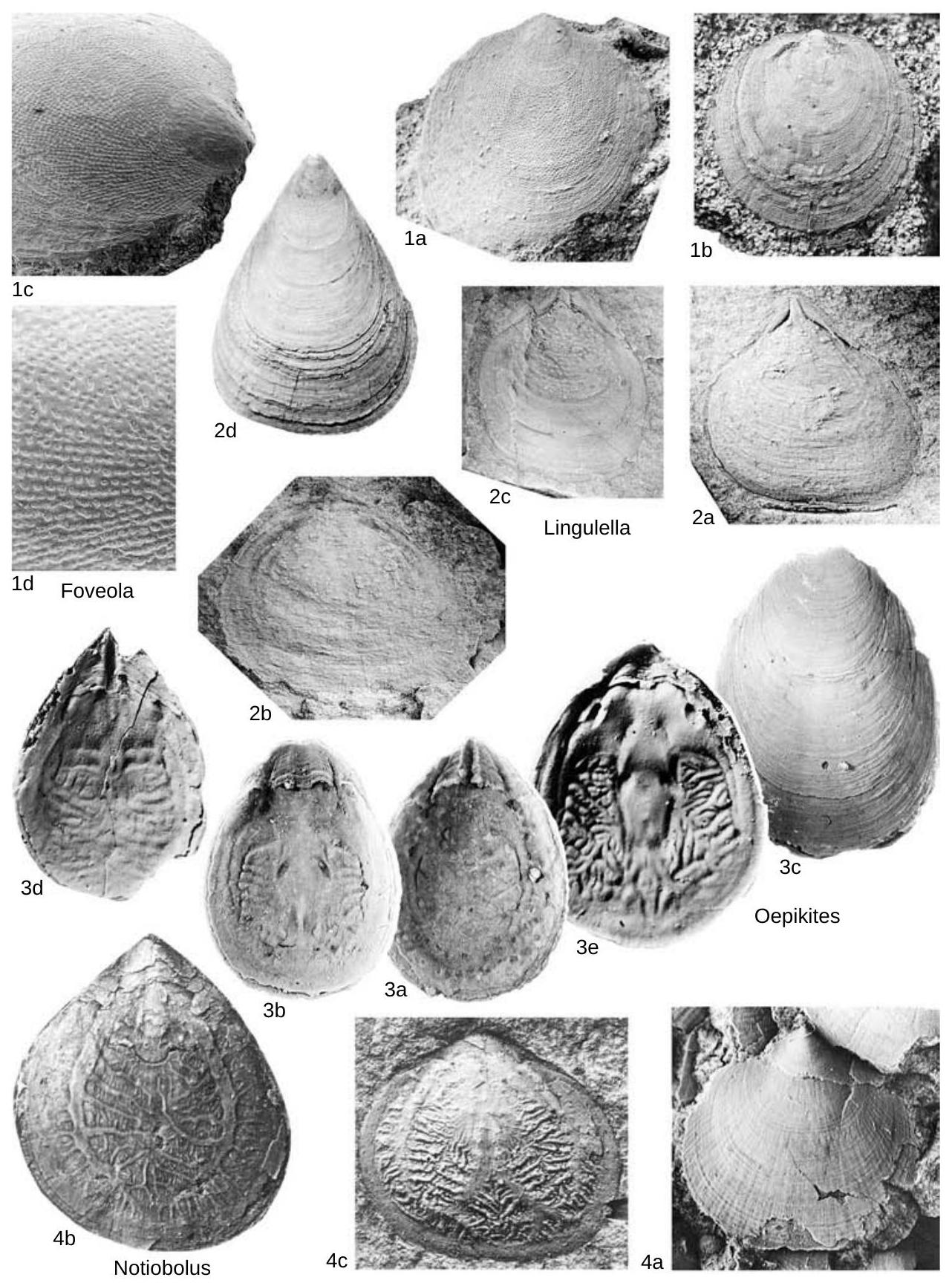Welcome to the Treatise on Invertebrate Paleontology!
Please enter a genera name to retrieve more information.

Lingulella
Classification
Phylum:
Brachiopoda
Subphylum:
Linguliformea
Class:
Lingulata
Order:
Lingulida
Superfamily:
Linguloidea
Family:
Obolidae
Subfamily:
Obolinae
Formal Genus Name and Reference:
Lingulella SALTER, 1866, p. 333
Type Species:
Lingula davisii M'Cor, 1851, p. 405, SD DALL, 1870, p. 159
Images
(Click to enlarge in a new window)
Fig. 17, 2a-c. *L. davisii (M'Coy), Lingula Flags, Merioneth Series, northern Wales, a, ventral internal mold, USNM 51740b, x2.1, b, dorsal internal mold, USNM 51740d, x2.1, c, ventral internal mold, NMW 24.479.G9, X1.7 (new).-Fig. 17, 2d. L. antiquissima (Jeremejew), Tosna Formation, Cordylodus proavus Biozone, Syas River, Ingria, ventral valve exterior, neotype, CNIGR 180/12348, X2.5 (Popov & others, 1989).
Synonyms
Geographic Distribution
cosmopolitan (exact stratigraphic and geographic range very uncertain at present)
Age Range
Beginning Stage in Treatise Usage:
Upper Cambrian
Beginning International Stage:
Guzhangian
Fraction Up In Beginning Stage:
50
Beginning Date:
498.75
Ending Stage in Treatise Usage:
Ordovician
Ending International Stage:
Hirnantian
Fraction Up In Ending Stage:
100
Ending Date:
443.07
Description
Shell elongate oval to subtriangular, thin shelled, subacuminate, ventral pseudointerarea with narrow, triangular pedicle groove, ventral propareas with well-defined flexure lines, visceral areas of both valves weakly impressed, dorsal visceral area with low median ridge, extending anterior to midvalve, anterior lateral and central muscle scars closely spaced, vascula lateralia peripherally placed.
References
Museum or Author Information
Classification
Phylum:
Brachiopoda
Subphylum:
Linguliformea
Class:
Lingulata
Order:
Lingulida
Superfamily:
Linguloidea
Family:
Obolidae
Subfamily:
Obolinae
Formal Genus Name and Reference:
Lingulella SALTER, 1866, p. 333
Type Species:
Lingula davisii M'Cor, 1851, p. 405, SD DALL, 1870, p. 159
Images
(Click to enlarge in a new window)
Fig. 17, 2a-c. *L. davisii (M'Coy), Lingula Flags, Merioneth Series, northern Wales, a, ventral internal mold, USNM 51740b, x2.1, b, dorsal internal mold, USNM 51740d, x2.1, c, ventral internal mold, NMW 24.479.G9, X1.7 (new).-Fig. 17, 2d. L. antiquissima (Jeremejew), Tosna Formation, Cordylodus proavus Biozone, Syas River, Ingria, ventral valve exterior, neotype, CNIGR 180/12348, X2.5 (Popov & others, 1989).
Synonyms
Geographic Distribution
cosmopolitan (exact stratigraphic and geographic range very uncertain at present)
Age Range
Beginning Stage in Treatise Usage:
Upper Cambrian
Beginning International Stage:
Guzhangian
Fraction Up In Beginning Stage:
50
Beginning Date:
498.75
Ending Stage in Treatise Usage:
Ordovician
Ending International Stage:
Hirnantian
Fraction Up In Ending Stage:
100
Ending Date:
443.07
Description
Shell elongate oval to subtriangular, thin shelled, subacuminate, ventral pseudointerarea with narrow, triangular pedicle groove, ventral propareas with well-defined flexure lines, visceral areas of both valves weakly impressed, dorsal visceral area with low median ridge, extending anterior to midvalve, anterior lateral and central muscle scars closely spaced, vascula lateralia peripherally placed.
